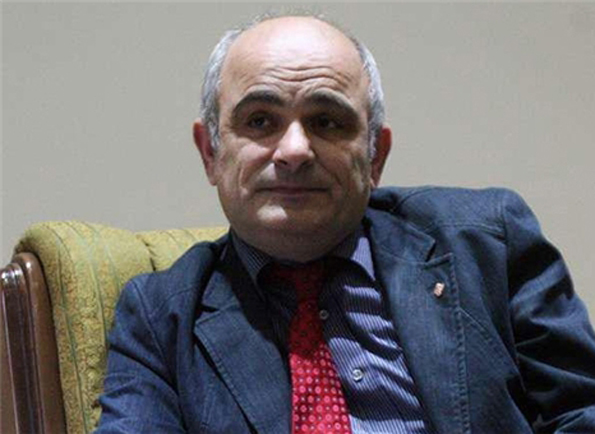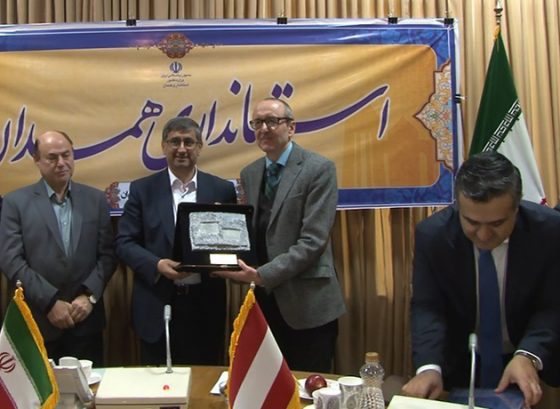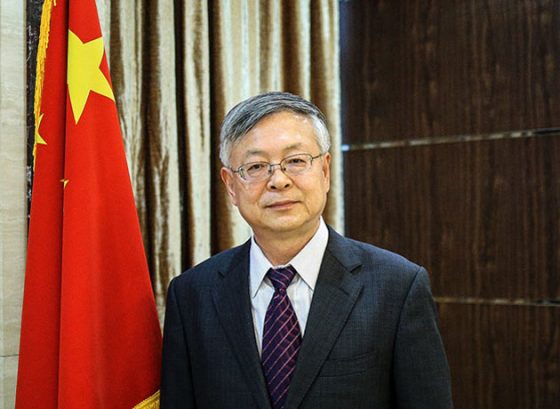Envoy: Russia Certainly Continues Anti-Terrorism Flights from Iran When Necessary

Russian Ambassador to Tehran Levan Dzhagaryan underlined that his country is not after setting up a permanent military base in Iran, adding that Moscow’s fighter jets will continue anti-terrorism flights to Syria from the Western Iranian airbase if necessary, AVA Diplomatic reports.
“Russia has not been after establishing a military base in Iran and the presence of the Russian fighter jets in Iran was temporary and based on the permission of the Islamic Republic’s senior officials, that is the Supreme National Security Council (SNSC),” Dzhagaryan said it on Wednesday.
Stressing that the Russian military men were sent to Hamadan base in Western Iran to conduct joint anti-terrorism operations in Syria, he said, “This cooperation will be repeated in the future and under agreement between the two countries’ senior officials if Tehran and Moscow deem it necessary.”
“These operations are aimed at taking revenge from the terrorists and I ask those who have criticized these operations if they are opposed to our fight against the terrorists and if we shouldn’t fight against them?” Dzhagaryan said.
His remarks came after Secretary of Iran’s Supreme National Security Council (SNSC) Ali Shamkhani also announced on Tuesday that the Russian airplanes which flew from the Western Iranian airbase of Nojeh for anti-terrorism operations in Syria last week returned home on Thursday after ending the first phase of their mission successfully, reiterating that similar cooperation will be done in future and depending on battlefield conditions.
“The Russian warplanes were not due to stay at Hamadan airbase, rather they were planned to fly from the airbase from Tuesday to Thursday (last week) and leave. The planes didn’t leave yesterday; (as a matter of fact) they left on Thursday based on the ground operations’ plans,” Shamkhani said in an interview with the state-run TV on Tuesday.
He dismissed foreign pressures as the reason behind the Russian fighter jets’ leaving the Iranian territories, and said, “Today, Iran has allied with Russia given its need to cooperation with powerful Russia and resistance front to confront the Takfiri plots and it is using Russia’s capabilities in air operations alongside the ground operations whose planners and military advisors are from Iran and it is a sign of might and not dependence.”
Shamkhani added that this has been the Iranian military advisors who had demanded Russian air force backup to render logistical support for ground operations in Aleppo.
Also yesterday, Shamkhani underlined that the military, intelligence and political alliance formed among Tehran, Moscow and Damascus has defused the US strategy of procrastination in anti-terrorism operations in Syria.
“The close coordination among Iran, Russia and Syria in conducting the recent operations against the Takfiri terrorists in Syria brought into failure the US protracting strategy for imposing its will on the security equations in Syria,” he said.
Stressing that the western and Saudi media’s psychological war against increased cooperation among Iran, Russia and Syria is aimed at diverting attention from the heavy failure of their allies in Palmyra (Tadmur), Idlib, Lattakia and Aleppo, Shamkhani said, “Certain western and Arab countries which have the illusion of changing the regional equations, have been paralyzed by the Islamic Republic’s political, defensive and security initiative in the recent operations.”
He dismissed certain imprecise views on anti-terrorism cooperation between Tehran and Moscow, and said, “The all-out relations between Iran and Russia which are based on the national interests and within the framework of strategic cooperation are not merely limited to the fight against terrorism and have more extensive aspects.”
Russia’s Ministry of Defense confirmed last week that it had deployed Tu-22M3 bombers and Su-34 strike fighters in Iran and these have already carried out airstrikes against terrorists in Syria.
“On August 16, 2016, Tu-23M3 long-range bombers and Su-34 bombers, having taken off from their base in Hamadan [Islamic Republic of Iran], carried out group airstrikes against targets belonging to Islamic State of Iraq and the Levant (ISIL) and Jabhat al-Nusra (Fatah al-Sham) terrorist groups in the provinces of Aleppo, Deir Ezzur and Idlib,” the ministry said in a statement.
Strategic long-range Tu-22M3 bombers have already delivered airstrikes in Syria against ISIL from the airfield.
The Russian defense ministry announced on Monday that it has called back its air fleet from Western Iran after accomplishing all planned anti-terrorism missions in Syria, but meantime underlined that similar missions will be conducted from the Hamadan air base in future based on mutual agreement with Tehran.
“The Russian aerospace forces will use the Hamadan Air Base in Iran on the basis of mutual agreements with Tehran, depending on situation in Syria,” the Russian defense ministry stressed Monday afternoon after two sides confirmed halt in Russian bombers’ flight from the Nojeh Air Base in Western Iran.
The defense ministry also said the aircraft that took off from Hamadan Base in Iran to bomb targets in Syria have all accomplished their tasks successfully, adding that the air force unit that conducted combat flights from Nojeh for three consecutive days last week has now returned to Russia after fulfilling all planned missions.
Russian bombers deployed at the Iranian Air Base carried out a number of airstrikes in Syria last week, destroying a number of command centers, headquarters, arms depots and training camp of the terrorists in several provinces across the Arab country.
Iranian Foreign Ministry Spokesman Bahram Qassemi had informed on Monday that Russia has stopped using Hamadan airbase for the time being.
“Russia has no base in Iran and is not stationed here. They did this [operation] and it has finished for now,” the spokesman told reporters.
Senior Russian diplomats, then, confirmed that Moscow has stopped using Iran’s Hamadan airbase for the time being, but may resume operations from there any time soon.
“Moscow sees no obstacles to the further use of Iranian infrastructure, including the air base in Hamadan, for strikes against terrorists in Syria,” Dzhagaryan told Interfax on Monday.
The Russian envoy also confirmed the halt, but underlined that the agreement between the two sides to further the operation from the Hamadan air base is still in place and Russian flights from there might resume soon.
“The Russian aerospace forces may resume operations from Iranian base Hamadan when it is expedient, and by the decision of leaders of Russian and Iran,” Levan Dzhagaryan said.
“All the Russian military have currently left Iran’s Hamadan Air Base,” he added.
The ambassador announced that Moscow hopes Russia and Iran will strengthen interaction in Syria settlement process.
“Interaction with Tehran on Syria has positive perspective,” the Russian official stressed.
Long-range Russian Tupolev-22M3 bombers and Sukhoi-34 fighter bombers used Nojeh Airbase, near the city of Hamedan in Northwest Iran, to launch the airstrikes against the terrorist groups in Syria for three days last week.




